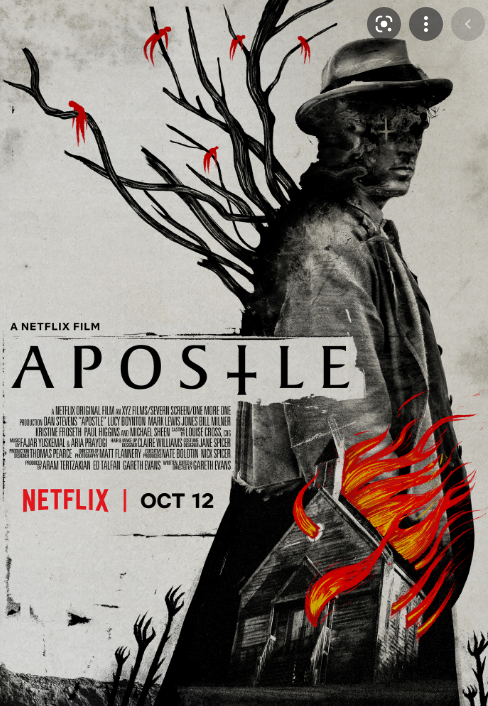What gods one believes in and whether the gods are real or not is not the most important thing; what is important is that true faith does not teach self-submersion and self-harm. On the contrary, it teaches one to emerge from blindness and fanaticism, to “save” oneself in life and to become a better person. Some time ago, Nicolas Cage released a B-movie called “Mandy”, which was supposed to make him lose his reputation as the “king of bad movies”.
At the time, a lot of people were interested in the film, and I was asked to tell them about it. Unfortunately, as word of mouth got out about the film, Mandy was not able to take up the mantle of “saving Cage”. However, there is a new film that has recently caught my attention. It’s also a revenge story with a cult theme and the same B-movie gore. What’s more, it has a much more exciting plot than Mandy – The Apostle.
The Apostle was directed by Gareth Evans, the director of The Raid, and starred Dan “Big Cousin” Stevens. However, both of them have turned our impressions of the film on its head – Big Cousin, instead of looking good, takes on the role of a manly, tough guy. Gareth also forgoes the simple, gritty action style he is known for, and instead delivers a suspenseful revenge against a lone dragon.
The story takes place over a hundred years ago in England, where the main character, Thomas, is a rich boy. In the opening scene of the film, Thomas receives a letter of blackmail. The letter states that his sister has been kidnapped by a mysterious cult and demands that he deliver a ransom. Not only that, but in order to keep his sister alive, Thomas must travel alone with the ransom money to an isolated island, where the cultists live.
Thomas is desperate for news, but he is not stupid and knows that if he does what the kidnappers want, he will end up with no money at all. So he decided to disguise himself as a member of the cult and infiltrate the island to find out more about the cult while looking for a chance to rescue his sister. Thomas studies the cult’s “sacred texts” Once he was ready, Thomas took the tickets sent by his kidnappers and boarded the boat to the island with the rest of the congregation. But he took care and swapped his ticket and that of another passenger before leaving the ship.
As luck would have it, his ticket had already been marked. And the passenger he had swapped was soon taking the blame for him and was secretly captured. Thomas was safely on the island and the first step in the rescue operation was a success. The next thing he had to do was to find out where his sister was being held captive. To hide his identity, Thomas eats, drinks and works his way to church with the congregation every day. In the process, he gradually learns the rules of the island and how the cult works. It turned out that the cult was led by three men, led by a man called Melkan. They believed in the island’s goddess, and Melkan called himself “the voice of God”.
They sought to create an isolated “utopia” on the island where everyone was equal. By preaching, they did attract a following of people who were either overtaxed or treated unequally.
The people of the island appeared to live an idyllic life, but in fact they did not. Not only must they obey the orders of Melkan in everything, but they also have to offer sacrifices to the goddess through self-inflicted blood sacrifices to pray for fair winds and rain. But how can the weather be at the will of man? Due to the harsh conditions, the island has not been able to grow crops for a long time and the livestock are not producing healthy young. Seeing that their “utopian dream” is unsustainable, Malcolm and the others have come up with the idea of kidnapping the rich to make money. By this point in the plot, Thomas has figured out what’s going on. Not only that, but he has accidentally acquired two helpers on the island. One is a young man, Jeremy, who is caught out at midnight curfew and has to help.
The other is André, Malcolm’s daughter, who is beautiful and kind-hearted and who has fallen in love with Thomas at first sight. However, just when things seem to be going well, something unexpected happens – Melkan tortures the unlucky passenger whom Thomas dumped and realises that the “ransom payer” has come to the island posing as a religious man. So, to uncover the “intruder”, Malcolm began a series of operations.
First, he gathered the newcomers and interrogated them, asking them to recite the sacred texts in front of him. The test did not fail Thomas, but instead uncovered an assassin sent by the king to destroy the cult. Then he took Thomas’ sister out into the street to parade her around, trying to force Thomas to reveal himself by torturing him as a hostage. But Thomas was not overwhelmed by anger and not only did he endure the ordeal, he also managed to determine where his sister was being held. Finally, Melkan sent his men to surreptitiously search the congregation’s rooms. This time, they found the map Thomas had marked in his room and finally established his identity as an “undercover agent”. The three decided to capture Thomas immediately and, in pursuit, cornered him in a secret tunnel. Little did Thomas know that this tunnel would hide the whole truth about the island – that the cult legends told by Melkan were not all false, but that a goddess really existed on the island. This goddess, whose body is connected to the land, is able to nurture the growth of crops and has been guarding the island for thousands of years.
However, the three Melkans were the first to discover this secret when they arrived on the island. They imprisoned the goddess in the tunnels and used her powers to fool the faithful in their quest to take over the mountain. To keep the goddess at their disposal, they fed her with human blood. This is the reason why the faithful had to offer blood sacrifices. But this did not change the Goddess’ hatred for humans. In revenge, she turned the island into a scorched earth, where no more crops could be produced. Gradually, more and more of the faithful lost their faith because the gods “did not appear” after the sacrifices.
This was unbearable for Melkan. So he began to rule brutally, secretly executing those who disobeyed and tried to escape and sacrificing them to the goddess. The woods of the island were hung with the bodies of the faithful. Thomas realised that if he could not save his sister, she too would end up as a sacrifice. And to avoid tragedy, he had to act now.
But then two of his helpers come on line – André, who quickly arrives in the tunnel and helps Thomas escape, and Jeremy, who manages to spark an infighting among the three Melkans, only to lose his own life. Thomas realises that it will take more than bringing down Melkan to save his sister and the rest of the suffering congregation. He had to destroy the cult once and for all. So he found the imprisoned goddess and set her on fire. He “killed” the god, but at the same time freed her. So, on her deathbed, the goddess passed on her powers to Thomas.
By the time Malcolm realises that the situation is bad, it is too late for him to turn the tide. At the end of the story, Thomas fights a bloody battle with the forces of the cult and both sides die together. His sister, on the other hand, escapes from the island in a boat with the repentant cultists. But just when it seems that the dust has settled, the story takes another turn.
A badly wounded Thomas is about to lie down and die when he finds that plants suddenly grow on the land and merge with his body – yes, he has taken over from the goddess as the guardian of the island. After watching the film, many people thought it was a proper crime thriller, as Thomas’ mission to break into the forbidden land was made to look dark.
The film is then thought to be a cult suspense film, as the everyday life on the island is made mysterious and spooky, with many details and images highlighting a sense of paganism; then suddenly it turns into a B-grade action film, as the film does not shy away from all kinds of flesh and blood shots in the fight between Thomas and the villain, but rather a bit of a violent aesthetic show; and in the end, it is found to be a fantasy film of gods and goddesses, with the end of Thomas lying flat on the ground and turning into a “god of men” being a divine unfolding ……
In addition to the mix of genres and styles, the story itself is also worth talking about. When you first see the setting of the film, it is easy to think of a classic cult thriller, The Wicker Man. The story of that film, too, takes place on a sheltered island and the revelation of a cult also begins with the disappearance of a young girl.
However, after watching the whole film, you will see that The Apostle is at best a fantasy version. And that’s what sets it apart from many cult films – the “god” that the believers believe in is not a lie, but a real thing.
However, even if the gods were real, this would not change the nature of the cult in the film. For the miracles are used as a tool to control others and to kill people with evil intentions. And the cult on the isolated island hides untold evils beneath its seemingly peaceful surface.
So, in a way, the film makes a very direct point. What matters is not what gods are believed in or whether they are real, but that true faith does not teach self-submersion and self-harm. On the contrary, it teaches one to emerge from blindness and fanaticism, to “save” oneself in life and to become a better person.













